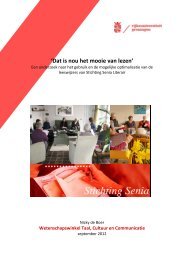Download het boekje - Wetenschapswinkel Taal, Cultuur en ...
Download het boekje - Wetenschapswinkel Taal, Cultuur en ...
Download het boekje - Wetenschapswinkel Taal, Cultuur en ...
You also want an ePaper? Increase the reach of your titles
YUMPU automatically turns print PDFs into web optimized ePapers that Google loves.
summer course in England and w<strong>en</strong>t on a school exchange to Swed<strong>en</strong>. After school, she w<strong>en</strong>t<br />
back to New Zealand for 9 months.<br />
Kathrin, just as Anna, took English and Fr<strong>en</strong>ch as languages in school and is now<br />
following the Dutch course after having lived in Groning<strong>en</strong> for two semesters. One year of<br />
secondary school she sp<strong>en</strong>t on a school in Australia, which she describes as the main reason for<br />
her profici<strong>en</strong>cy level of English. She also worked in Paris for five weeks in 2011 which helped<br />
improve her Fr<strong>en</strong>ch a lot.<br />
Evid<strong>en</strong>tly, the contact betwe<strong>en</strong> foreigners and natives can be established easily by travelling the<br />
world, especially if they speak the same language. The stud<strong>en</strong>ts share this opinion. That is why<br />
they all signed up for the Dutch course at the Language C<strong>en</strong>ter. Learning the language of the<br />
country of resid<strong>en</strong>ce was a big part of the decision making process. According to all of them, it<br />
is rude and impud<strong>en</strong>t to just assume all Dutch speak German or English, so the girls are trying<br />
their best to at least learn the basics of the language. So far, it has be<strong>en</strong> a good experi<strong>en</strong>ce, but<br />
all of them indicated that the profici<strong>en</strong>cy could be improved over the next few months.<br />
A Question of Motivation<br />
During the interview, an important thought came to mind: learning languages seems to be<br />
dep<strong>en</strong>d<strong>en</strong>t on not only tal<strong>en</strong>t, but mainly on the learner’s motivation. All three stud<strong>en</strong>ts said to<br />
be interested in learning languages and that their motivation is the key to their success. The<br />
learner needs to ask himself: how badly do I want to learn the language? Did I ever have<br />
contact with the language before? What are my past experi<strong>en</strong>ces with the language, the native<br />
speakers or the country where it is spok<strong>en</strong>? What are my goals? What can I reach with adding<br />
that language to my linguistic repertoire? – These are all questions of utmost importance.<br />
Having a gift for languages can be of great help in language acquisition, but it does not<br />
eliminate the success of studying out of interest. People without the tal<strong>en</strong>t are most likely to<br />
succeed in their ways, as long as they are<br />
motivated and devoted to the chall<strong>en</strong>ge<br />
(Dörney, Z., 1998).<br />
There certainly are other factors that<br />
influ<strong>en</strong>ce the success in learning languages as<br />
well, such as communicative compet<strong>en</strong>ce and<br />
All three stud<strong>en</strong>ts said to be<br />
interested in learning languages<br />
and that their motivation is the<br />
key to their success.<br />
skills, but during the talk with the stud<strong>en</strong>ts the motivational aspect came up several times. Also,<br />
the personal judgm<strong>en</strong>t of the skills is important. People that t<strong>en</strong>d to underestimate their tal<strong>en</strong>t<br />
for certain things are unlikely to succeed and reach their goals. Furthermore, the stud<strong>en</strong>ts<br />
indicated that they possess an <strong>en</strong>ormous amount of curiosity for other languages and cultures-<br />
all of them are planning on doing more internships or semesters abroad and might ev<strong>en</strong><br />
consider taking a job that implies travelling and/ or international communication on a regular<br />
basis. Of course it is important to develop a realistic view on how the learning is going, how it<br />
has improved and what factors might be holding one back and have to be eliminated. The<br />
situation and the learning <strong>en</strong>vironm<strong>en</strong>t play a huge role as well. One is more likely to<br />
accomplish a task in an <strong>en</strong>vironm<strong>en</strong>t that makes one feel secure. If, for example, the teacher<br />
criticised one’s work perman<strong>en</strong>tly, the self-esteem concerning language skills is harmed. Once<br />
that is happ<strong>en</strong>ed, it is very hard for the person to re-invigorate and restore their self-esteem.<br />
That is why self-awar<strong>en</strong>ess is so important (Williams and Burd<strong>en</strong>, 1997).<br />
52 | W i e g e e n v r e e m d e t a l e n k e n t , w e e t n i e t s v a n z i j n e i g e n t a a l




